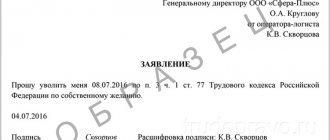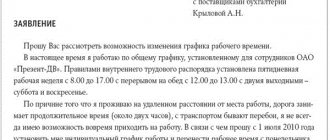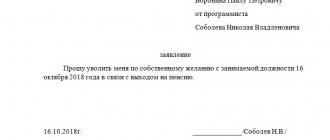Sometimes, in order to evaluate an employing company, one interview with the manager is not enough. Often the only way to find out how things really are is to experience them in practice. In such cases, the opportunity to work on a probationary period is indispensable, which allows the company and the candidate to take a closer look at each other and finally become convinced of the permissibility of further employment relationships. If it turns out that you will no longer have to work together, the probationary period allows you to carry out the dismissal procedure according to a simplified scenario. The required service upon dismissal will also differ slightly from the standard one.
- 2.1 Video: dismissal without work
Is it possible to fire/resign during a probationary period?
Checking a new employee for prof. suitability is a common requirement for many businesses. The purpose of the probationary period is:
- Checking the level of qualifications that the hired employee meets for the position;
- Checking the proportionality of a potential worker’s job requirements.
The probationary period also helps the employee evaluate the conditions offered by the employer.
The following have the right to terminate the employment relationship during the probationary period:
- employer;
- employee on probation;
- both parties, having previously agreed on this.
If during the probationary period the employer was not satisfied with his work, he can report that the employment relationship will be terminated. But the employee himself should be notified three days before leaving with a written explanation of the reason.
A potential worker may leave before the end of the probationary period if, during the course of his work, he realizes that he cannot cope with his responsibilities. Written notice to the manager, given three days before leaving, should include this as the reason.
Information
If the employee and the employer mutually come to a common decision - dismissal, they stipulate terms, payments, the need for work, and describe them in the agreement.
Do I need to work 2 weeks?
According to Art. 70 of the Labor Code of the Russian Federation, the permissible duration of the probationary period is up to 3 months. The exceptions are the head of the organization, the chief accountant, their deputies, and heads of individual structures - for them it is possible to increase the period to six months. For persons working under a fixed-term contract for a period of 2–6 months, tests last up to 2 weeks.
Both parties have the right to terminate the employment relationship during this period, which is regulated by Art. 71 Labor Code of the Russian Federation. That is, dismissal during the probationary period is carried out according to:
- employee decision;
- initiative of the employer.
It is possible to reach a compromise between the parties by formalizing an agreement.
If an employee resigns voluntarily, you need to notify the employer in advance and know how many days you need to work upon dismissal. However, the period of work at the end of the contract during the probationary period is reduced compared to the standard one.
Is it necessary if I resign of my own free will?
If the trainee considers the job or its conditions unsuitable for him, he has the right to quit at any time, informing the manager in writing 3 days in advance (Article 71 of the Labor Code). This period also includes weekends.
The working period for the standard termination of employment is 2 weeks; during the probationary period it is reduced to 3 days.
Termination of the contract during the testing period, at the request of the employee, is carried out in several stages:
- Submitting a corresponding application to the employer in person or by mail.
- Work within 3 days or its absence for good reasons, by agreement with the manager.
- Drawing up a dismissal order and familiarizing the employee with it.
- Issuance of a work book and other working documentation to the employee (upon request).
- Carrying out calculations and calculating payments.
The working period begins on the next day after the application is submitted and registered. A standard note about voluntary dismissal is entered into the work book. The legislation allows the use of such wording even if the employee fails the test (instead of a mark of unsuitability).
On the initiative of the authorities
Dismissal of an employee during a check of his professional qualities is permitted subject to compliance with the mandatory requirements:
- The employee must be informed about the termination of the employment relationship at least 3 days in advance.
- The leader identifies the reasons behind his decision. These include:
- disciplinary actions;
complaints from colleagues or clients;
- lack of qualifications and so on.
The employee must provide an explanation for his actions.
The employee has the right to appeal the manager’s decision in court, so the employer will need to confirm all evidence of unprofessionalism and violations.
The dismissal procedure then includes:
- 3-day work.
- Making an order.
- Payment of funds (including for unpaid vacation).
- Issuance of a work book. It contains a record of failure to complete the probationary period with reference to Art. 71 TK.
The employee must confirm in writing that he has read the documentation. Since the employee did not pass the test, severance pay is not accrued to him. It is possible to terminate the employment relationship without working off, by agreement between the parties.
An employer does not have the right to fire a person on a probationary period if he is on sick leave. This is permissible only by voluntary decision of the employee. And about dismissal after the probationary period is described here.
also not allowed to terminate a contract with a pregnant woman. According to the law, a probationary period is not applicable to her at all, but it happens that an employee finds herself in this situation already during the inspection period - then the employer does not have the right to fire her. A woman can leave work only of her own free will.
Dismissal procedure
The procedure for leaving the workplace consists of the following steps:
- The employee fills out an application with a request to terminate the employment relationship.
InformationThe application does not have a clear template, but it should have: in the header an appeal to management, basic information, a summary with a signature.
- The second party must familiarize itself with the submitted petition and confirm it with a signature.
- Next, a dismissal order is issued, which the employee familiarizes himself with.
- After work (if it takes place), the employee is given: documentation (copies of passport, resume, diploma, etc.) with a calculation, a completed work book.
- A signature is affixed to the accounting journals regarding the payment and documents issued.
The procedure for dismissal at the initiative of the employer
A probationary period is regarded as an advantage for the employer and the candidate for a vacant position. As for the employer, the director of the company, setting up an internship for a potential employee, has the opportunity not only to test the knowledge and professional skills of the worker, but also to dismiss him due to the inadequacy of the subordinate for the position held.
The indicated circumstance is considered the most common reason for dismissing an intern during the probationary period. At the end of the probationary period, it will not be possible to dismiss the employee due to improper completion of the internship. However, it is worth knowing that the boss has the right to cancel the working agreement with the employee during the probationary period and in the presence of other, necessarily legal reasons. For example, dismissal during a probationary period can be made on the basis of violation of labor discipline, coming to work under the influence of alcohol or drugs, or damage to company property. This is evidenced by article number 71 of the Labor Code of the Russian Federation .
If the termination is initiated by the supervisor, it is important to remember that the intern is subject to the standard rules that apply to key employees. The main thing is the mandatory documentary evidence of the legitimate reasons for dismissal during the probationary period. If an employee regularly violates the terms of labor legislation or fails to cope with the duties assigned to him, the boss must record this fact through an appropriate act. The lack of documentary evidence for dismissing an intern deprives the employer of the legal right to terminate the work contract and, if the employee appeals to a judicial authority, the employer risks being held liable.
Also an important condition for dismissing an employee during a probationary period is early notification. The notice is presented for review 3 days before the expected day of dismissal or before the end of the test period. If the notice is not provided to the worker for review within the prescribed period, then the trainee is considered to have completed the probationary period.
Can a pregnant woman be fired?
Many workers, in the process of carrying out their professional duties, are interested in the question: is it possible to fire a pregnant woman during a probationary period? To answer, you should refer to the content of labor legislation. Thus, based on article number 70 of the Labor Code of the Russian Federation , the employer does not have the right to make a decision on assigning a probationary period for employment to a pregnant woman. It follows from this that a pregnant woman is hired for a vacant position on the terms of the main employee and the employer has no right to dismiss her due to failure to pass the test period.
Also common are cases when an employee finds out about the fact of pregnancy during the probationary period. In such a case, the boss also does not have the right to formalize the dismissal, however, for this, the employee is obliged to notify the manager by providing a certificate from the antenatal clinic.
Notification
Notifying the trainee of the employer's intention to dismiss during the probationary period is a mandatory act on the basis of which the process is implemented. If the employer does not notify the employee of dismissal on time, the testing period comes to an end and the employee will be considered to have passed it.
Contents of the notice of dismissal:
- Name of company;
- Personal information and position of the subordinate to whom the notice is addressed;
- Date of registration;
- The main part of the act requires a justified presentation of the reason for dismissal during the probationary period;
- Indicate the names of documents that serve as confirmation of a legal circumstance for termination of cooperation between the parties;
- At the end, the signatures of the worker and the director of the enterprise are affixed.
The trainee’s signature is a mandatory detail that the employer must pay attention to. This step will indicate that the subordinate is familiar with the act. If the employee does not agree with the dismissal during the probationary period, he may refuse to sign it. In this case, the employer is obliged to draw up an appropriate act to record the refusal of the subordinate with the signatures of two witnesses.
Working off
Dismissal during the probationary period must be notified in advance to both the employee and the employer; this period is three days. This period of time is considered working off.
When dismissal is initiated by the employer, he himself determines the terms of service. Although, according to the Labor Code of the Russian Federation, he is obliged to inform in advance about his decision to terminate the employment relationship, often the termination of the employment contract occurs on the same day as the notice of dismissal, or the next. This happens because the employer is not interested in the work of an employee who has not passed the probationary period.
Attention
If a mutual agreement has been reached between the employer and the employee, the employment relationship ends at any time without accompanying work.
If the initiative to dismiss during the probationary period comes from the employee, then valid reasons for severing the employment relationship will allow you to avoid a three-day work period. The law defines the following cases:
- if the employee is enrolled in a university;
- reaching retirement age;
- in the presence of a disease that limits a person’s ability to work;
- when moving to improve health;
- if a family member is transferred to serve in another city.
Attention
In this case, in addition to the application, you will need to provide documents confirming the “validity” of the reason (certificate of enrollment in a university, a certificate from a doctor about the disease, etc.).
Working off can also be replaced by short-term vacation or sick leave. Days of rest and absence due to illness are taken into account in the working hours, and you should not go to work additionally (if there are more than three days), except for work and payments.
When processing is not needed
Before determining the duration of the contract termination procedure, you should figure out whether a specific person needs to work out, based on specific circumstances. In some cases, it is impossible to reduce the working time. This happens when:
- The administration does not consider it necessary to retain the employee and is able to resolve the personnel issue immediately by hiring a new person without organizing the transfer of cases.
- The employer made errors in the execution of the written notice - the date of the expected termination of the contract was not indicated.
- A hired specialist reaches retirement age.
- Persons moving to another area without the opportunity to perform work duties.
- Future students of educational institutions accepted for full-time study.
The use of work during the probationary period has a lot of nuances, failure of which on the part of the employer threatens a lot of troubles, with courts and inspections, if the dismissed person decides to contact the appropriate structures to challenge the decision of management. For this reason, many employers prefer to dismiss personnel “at their own request,” eliminating the risk of invalidation of dismissal with shortened hours.
© 2021 zakon-dostupno.ru
- Related Posts
- How to legally quit in one day without working time
- Reinstatement of an employee at work: difficulties and solutions
- Dismissal at your own request during a probationary period
What payments are due?
Upon dismissal, an employee is provided with payment for hours worked in the company and compensation for unused vacation. If there are other payments specified in the collective or employment agreement, the employee is also paid these amounts of money.
Attention
Compensation payments are made regardless of the reasons for ending the working relationship.
Payments are made on the last day of work. In the event of dismissal due to liquidation or reduction, the dismissed employee is also entitled to payment of severance pay. Read more about payments in this article.









